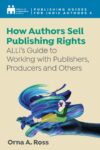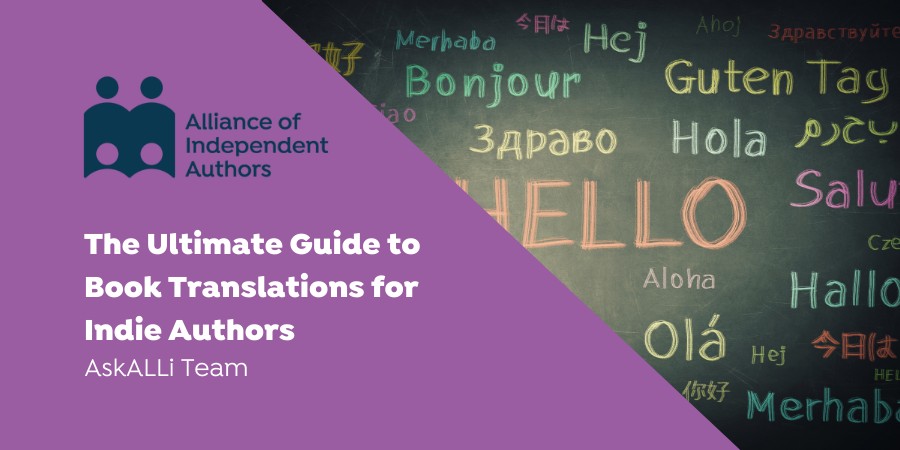When you first start writing, translations might not be your first thought. Just get the book written. Worry about your native language first. Then figure out translations if you're successful. As indie authors, translations have traditionally been elusive and difficult to access. But as technology and the industry open up, that's changing. Today, the Alliance of Independent Authors AskALLi team is looking at book translations for indie authors. The options, formats and methods.
The Alliance of Independent Authors ran a six month program with various successful indie authors, Michael Anderle from LMBPN and literary agent, Ethan Ellenberg. The aim of the program was to open up the rights industry to indie authors through publicly accessible education and coaching services. You can find out more here.
 How Authors Sell Publishing Rights: ALLi’s Guide to Working with Publishers, Producers and Others is one of the books in the Alliance of Independent Authors’ Publishing Guides series. ALLi members can download their complimentary ebook copy of How Authors Sell Publishing Rights in the Member Zone. Navigate to allianceindependentauthors.org and log in. Then navigate to the following menu: BOOKS > GUIDEBOOKS. Other formats are available to members and non-members in ALLi’s Bookshop.
How Authors Sell Publishing Rights: ALLi’s Guide to Working with Publishers, Producers and Others is one of the books in the Alliance of Independent Authors’ Publishing Guides series. ALLi members can download their complimentary ebook copy of How Authors Sell Publishing Rights in the Member Zone. Navigate to allianceindependentauthors.org and log in. Then navigate to the following menu: BOOKS > GUIDEBOOKS. Other formats are available to members and non-members in ALLi’s Bookshop.
Translations in 2022 from a Literary Agent's Perspective

Ethan Ellenberg, President of the Ethan Ellenberg Literary Agency
Ethan Ellenberg is President of the New York based Ethan Ellenberg Literary Agency and has been working as an agent for more than 30 years. He is best known for his work in genre fiction of all kinds and represents a number of bestselling authors including John Scalzi, Dennis E. Taylor, Sharon Shinn, MaryJanice Davidson, Shelly Laurenston, Bertrice Small and others. He also represents top children’s talent including Caldecott winner Eric Rohmann, Golden Kite Award Winner Candace Fleming and the TD Canadian Children's Literature Award winner Marthe Jocelyn. He is the co-founder of Royalty Reminder, a web-based software application created for Authors to inventory and manage all their intellectual property.
We asked Ethan a number of questions:
What are the benefits and downsides of selling foreign rights?
It's a vital income stream for many Authors. For top selling Authors the income can evolve into 20% or 30% of their total income. As it is primarily negotiating and signing licenses there is little downside. You can also commission your own translations but the average price is $5,000. You are not a local publisher. You probably have little knowledge of these specific foreign markets, so success may be hard to come by. You can go direct but be aware of these challenges. A license may only provide you with about 10% of a book's sales but there is no capital expenditure and hopefully you are in the hands of real local pros.
Are there any nuances or changes you’re seeing in the market/industry as of 2022?
Some important new players continue to build in the market, Storytel, Egmont, etc. Foreign audio is emerging. We are seeing offers from China for app oriented sales of serial fiction. There really is a lot going on. It's a lot to navigate but this is new money, new opportunity. It's really a very good thing. Webtoons are also starting to get active with fiction from novel authors.
Is there anything that indie authors might need to watch out for contractually?
When is the right time to approach an agent?
If an Author feels that the offer is very straightforward and they are willing to essentially take what they have there may be no room for an agent. Agents work with co-agents, local agents who specialize in selling rights in their home countries so the commission is a combined 20%. In return you get a negotiated license, a professional partner with a career perspective and his partner the local co-agent, help with tax and royalty issues, etc. So it's a value proposition. You have to ask yourself whether it make sense to bring on an expert or not.
Anything else you might have to add that I haven’t thought to ask you but would be beneficial to authors?
ALLi Member Case Study: Clare Lydon Working with Publishers
Clare Lydon is a London-based writer of contemporary lesbian romance. She's a No.1 best-seller on lesbian fiction charts around the globe. If you love romantic comedies, prepare to fall head over heels in love. Find out more at: www.clarelydon.co.uk.

Lesbian Romance Author, Clare Lydon
Can you explain briefly how you translated your books and why you chose the market you did?
What are the biggest challenges with translations?
How are you marketing your books in a different language?
Any other tip or piece of advice you think writers approaching translations should know?
ALLi Member Case Study: David Penny Working With a Translation Company

Historical novelist, David Penny
David Penny is the author of the Thomas Berrington Historical Mysteries set in the chaotic final years of Moorish al-Andalus in Spain. He started writing again after a lapse of almost 40 years. After being traditionally published in his 20’s with four science fiction novels, he chose to publish independently on his return to writing. David’s work is available in eBook, print and audio, as well as a translation into Spanish and German. Find out more at davidpenny.com.
Can you explain briefly how you translated your books and why you chose the market you did?
I initially started to translate my work into Spanish using Babelcube, but soon discovered the service left a great deal to be desired, and sales were poor.
At a judicious meeting at the London Book Fair in 2019 I was talking with Joseph Alexander, who told me he had created his own translation team to work on his Guitar tutorials. He said he was thinking about offering the service to Fiction authors and would I like to test the service. I agreed, and it was the start of a relationship which continues to this day. I chose German because after some vague research it appeared to be a market which had a high level of readership and enjoyed Medieval fiction.
Since then, I have paid for the translation of, to date, ten titles. Germany is now my best sales channel by far, and the first nine titles have been in the Historical Thriller and Historical Mystery top 100 charts for over a year.
What are the biggest challenges with translations?
Finding the right translator can be a problem. As mentioned, I went initially with Babelcube but the service offered was poor, and my translation received a large number of negative reviews and comments. So much so that I paid for a re-edit of the book by a new translator and uploaded that. With translatebooks.com I have a much closer relationship to both Joseph Alexander and his team of translators.
With all translations, unless you have some proficiency in the language being translated into, you are very much in the hands of your translator. Which means you really must choose with care.
You also need to remember all the extras around your book. You must have your blurb translated, the keywords to use for Amazon, your author page on Amazon.de (in my case). There are many small bits that you need to gather so you can present a professional, complete package to the reader.
How are you marketing your books in a different language?
Initially I marketed my German titles using Facebook Ads but have since moved to using Amazon Ads exclusively. The amount I spend on advertising would likely make many author’s eyes water, but I earn back at least three times what I spend, and without the advertising my sales would, I am sure, be far less. I have considered setting up a German language newsletter but would be unable to produce this myself so concentrate purely on advertising via Amazon.
Any other tip or piece of advice you think writers approaching translations should know?
- If you want to offer your books in translation you need to ensure that they are already selling reasonably well in your usual markets, mainly the UK and US. Getting translations can prove costly and you are unlikely to sell much better in a foreign market if you are not already selling fairly well in the English-speaking ones.
- Ask questions of your translator/s.
- What have they worked on before?
- Have they translated books of a similar style to yours?
- Make sure they have translated fiction and not just non-fiction (unless your title is non-fiction, in which case turn the question around).
- Remember that you will also need your book cover translated so arrange that early.

Miranda Bridges, Author





There’s a good number of articles out there on this topic and most of the times Babelcube is presented as a good option for authors because they don’t have to pay to have their books translated (they can simply share royalties, if any, with the translator).
I’m pleased to see this is not the case here. I’m sorry for the author who had a bad experience with Babelcube, but I’m glad he spoke out.
As a literary translator myself, I know that the quality of the translations commisioned on Babelcube is very, very low. 8 times out of 10 you can spot a typo or a mistake of some kind in the first page of the translated book and that would put off any potential reader.
If you want your book translated, choose an agency, look for a professional on Reedsy or Proz.com, but don’t waste your time with platforms like Babelcube. You won’t find any professionals there.